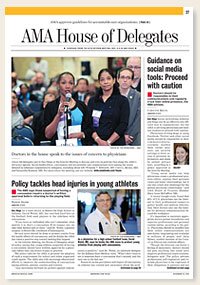AMA House of Delegates

Betsy L. Thompson, MD, DrPh, chief medical officer for the Centers for Medicare & Medicaid Services' Region IX office in San Francisco, spoke during an educational session at the AMA Interim Meeting. Photo by Ted Grudzinski / AMA
AMA meeting: Physician input welcomed on meaningful use, CMS official says
■ A CMS regional chief medical officer says past medical association suggestions have improved rules governing bonus pay for EMR use.
By Victoria Stagg Elliott — Posted Nov. 22, 2010

- INTERIM MEETING 2010
- » Our coverage
- » Print special section
- » AMA official proceedings
- » Meeting notes: Legislative actions
- » Related content
San Diego -- With stage 1 regulations for meaningful use released and discussion begun on stage 2, a federal official speaking at the AMA Interim Meeting called for more feedback to ensure these regulations will be workable for physicians.
"We need to work together and make sure that meaningful use is defined and carried out appropriately," said Betsy L. Thompson, MD, DrPh, chief medical officer for the Centers for Medicare & Medicaid Services' Region IX office in San Francisco. She spoke during an educational session at the meeting. Based on a show of hands when she asked the crowd about EMR use, about half of the participants had an EMR in their offices, and the remainder were considering getting one.
Stage 1 rules are intended to increase adoption of health information technology, stage 2 rules are meant to change the process of care, and stage 3 rules are for improving outcomes. "Right now our emphasis is for practices to adopt and start to use these systems," Dr. Thompson said. "At stage 2, we expect processes of care to change so that we can truly improve outcomes and population health by stage 3."
Achieving meaningful use at the three stages qualifies physicians for financial incentives for using electronic medical records. They were part of the 2009 economic stimulus package. While finalizing meaningful use standards for stage 1, CMS received more than 2,000 comments, including those from the AMA and other medical associations.
"We had to read and respond to each, and the comments improved the rule substantially," Dr. Thompson said.
This led to stage 1 rules being issued with more flexibility for physicians and deferral of some early requirements, but the AMA continues to request improvements.
"These are challenging times. ... It is worth the effort to be able to collect data and collaborate with each other for the betterment of the patient, but we have reasons to be concerned and worried about what the future holds," said AMA Trustee Steven J. Stack, MD.
Stage 2 of meaningful use is scheduled to begin in 2012.












